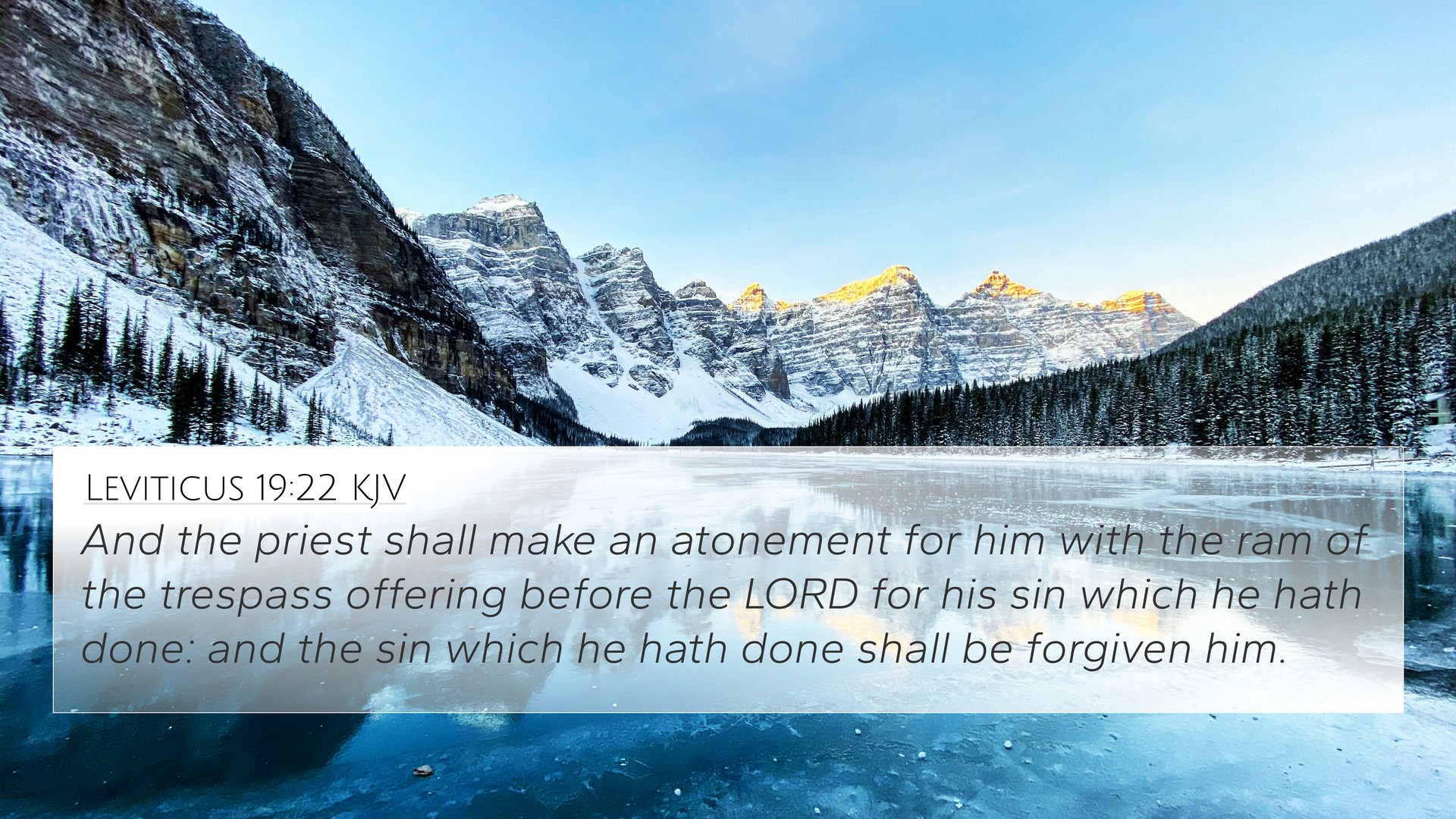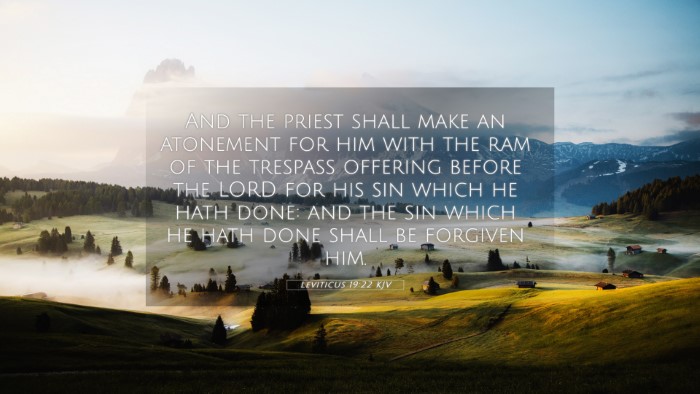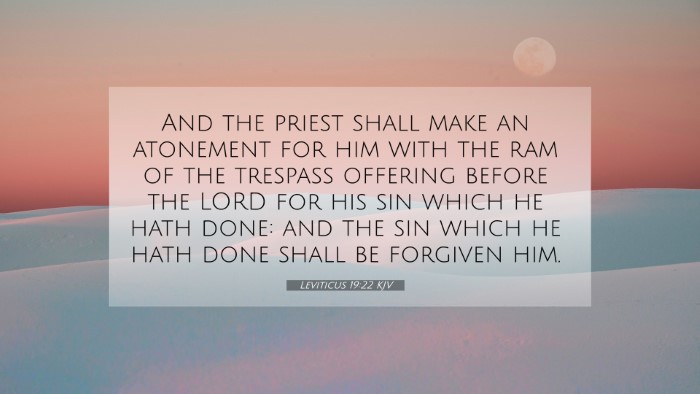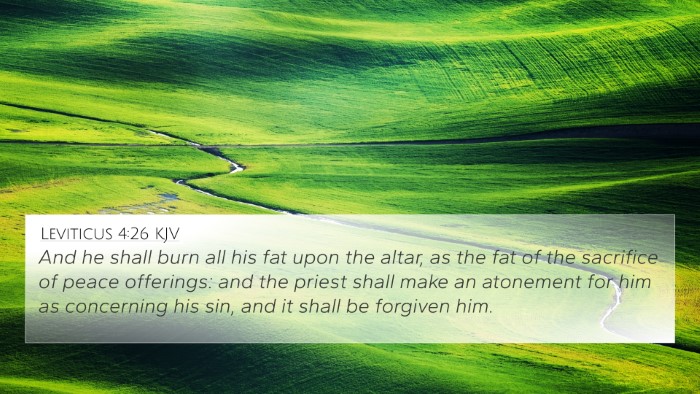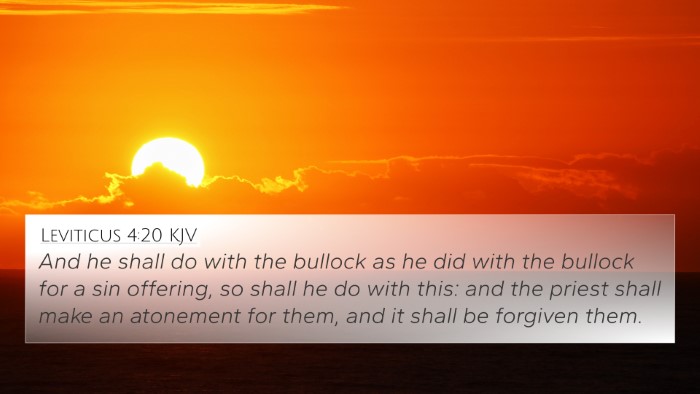Understanding Leviticus 19:22
Leviticus 19:22 reads, "And the priest shall make atonement for him before the Lord, and he shall be forgiven for any one of the things that one may do, violating any of the Lord's commandments." This verse is crucial as it speaks to the provision of atonement through the role of the priest in the Israelite community.
Context and Significance
In the broader context of Leviticus 19, this verse emphasizes the holiness of God and the Israelites' need for purification and forgiveness to maintain their covenantal relationship with Him.
Key Insights from Public Domain Commentaries
-
Matthew Henry:
Henry suggests that this verse highlights God's merciful nature, providing a means for individuals to be restored to fellowship with Him despite their transgressions.
-
Albert Barnes:
Barnes elaborates that this atonement process symbolizes the importance of recognizing our sins and seeking forgiveness through the proper channels established by God.
-
Adam Clarke:
Clarke discusses the theological implications, noting that this practice foreshadows the ultimate atonement through Jesus Christ, further linking the Old and New Testaments.
Bible Verse Cross-References
This verse connects to several other scriptures, providing a rich ground for comparative analysis:
- Exodus 29:36: Discusses atonement for the altar and signifies the seriousness of sacrificial offerings.
- Leviticus 5:5-6: Outlines the procedure for guilt offerings, which indicates the method of confession and sacrifice for forgiveness.
- Hebrews 9:22: States, "Without the shedding of blood, there is no remission," paralleling the atonement practices of the Old Testament.
- 1 John 1:9: "If we confess our sins, he is faithful and just to forgive us our sins," reaffirms the continuous requirement for atonement.
- Isaiah 53:5: Points to the suffering servant, suggesting that Christ's suffering was for our transgressions, linking again to atonement.
- Romans 3:25: Discusses Christ being set forth as a propitiation, a concept that is rooted in the atonement practices of Levitical law.
- Hebrews 10:4: Notes, "It is impossible for the blood of bulls and goats to take away sins," highlighting the limitations of the sacrificial system in contrast to Christ's ultimate sacrifice.
Thematic Bible Verse Connections
The themes of atonement, forgiveness, and priestly intercession present in this verse resonate throughout the Bible:
- Forgiveness: A recurring theme, seen in Psalms (e.g., Psalm 103:12) and the teachings of Jesus (e.g., Matthew 6:14-15).
- The Role of Priests: Further explored in Hebrews, especially regarding Jesus as the High Priest (Hebrews 4:14).
- Sacrifice: The connection between the sacrificial system and Jesus' death (John 1:29) indicates how the Old Testament practices find their fulfillment in Christ.
Conclusion
Leviticus 19:22 provides a profound insight into God's character as merciful and forgiving, while also illustrating the critical role of the priesthood in the life of Israel. The study of this verse and its connections enriches our understanding of the entire Biblical narrative concerning sin, atonement, and redemption.
Tools for Bible Cross-Referencing
For a deeper exploration of connections between Bible verses, one can utilize various tools:
- Bible concordance for cross-referencing verses.
- Bible cross-reference guides that provide thematic connections.
- Cross-reference systems like those found in study Bibles.
- Comprehensive materials for deeper dives into Biblical themes.
Understanding the linkages among scriptures not only enhances knowledge but also deepens faith as believers grasp the cohesiveness of God's message throughout the ages.
Further Study Suggestions
To gain a more profound insight into Leviticus 19:22, consider:
- Exploring the significance of Old Testament sacrifices in the light of New Testament teachings.
- Studying parallels in the Gospels, particularly in the context of Jesus’ role as the ultimate sacrifice.
- Engaging in cross-referencing Bible studies to discover how this verse interacts with others on the same theme.
